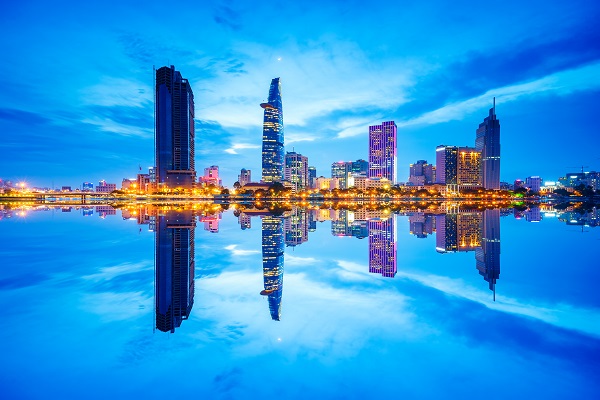Sunrise on the beach: Vietnam’s vibrant property market

Riding
The Vietnamese economy
Vietnam has undergone remarkable growth and development over the past 30 years. The launch of the Đổi Mới Policy in 1986 transformed the country from one
The Vietnamese real estate market
In July 2015, the Housing Law and the Law on Real Estate Business, whereby foreign property investors could purchase and legally own residential property in Vietnam, came into effect. The types of property available to foreigners include apartments, villas and townhouses, as long as they are parts of development projects. Foreigners, like locals, can enjoy rights to lease, trade, inherit and collate their properties. Among the major taxes and fees associated with real estate investment in Vietnam are a registration tax (0.5%),
The laws are also expected to spur growth in the commercial and industrial sectors, as foreign companies and representative offices are now eligible to purchase new and existing properties, provided that the properties are purchased for business purposes. The regulatory changes helped to stimulate investor interest and drive the real estate market, making Vietnam one of the most attractive destinations in the region.
The Ho Chi Minh City market
Being the economic centre and the most populous city in Vietnam, Ho Chi Minh City (HCMC) has particularly benefitted from the massive expansion of the real estate market. HCMC is a new market and is currently at the start of an upward trend in the real estate industry lifecycle. In 2015, the Urban Land Institute and PwC ranked the city fifth in terms of favourable investment prospects
HCMC
According to JLL, HCMC had about 80,000 apartment units in 2016, where affordable,
Thus far, foreign
Expectations for the HCMC market
The premium and luxury apartment segment is expected to maintain its high absorption level above 50%, considering its small size compared to other segments. the segment is still attractive to foreigners and affluent locals, as prices for luxury projects in HCMC are still relatively low compared to other cities in Southeast Asia. This segment is expected to introduce more unique offerings in 2017 and beyond to attract high net worth investors. Thus, the stock of premium apartments priced above USD 2,000 per sq m is expected to double within the next three years.
At the same time, the number of affordable housing units worth less than USD 45,000 fails to meet demand in HCMC. According to the World Bank, with the current urbanisation trend in the country, the urban population is expected to reach around 50% by 2040, creating demand for approximately 374,000 additional units in cities every year. To address the issue, the Government is seeking ways to encourage developers to undertake more affordable housing projects. Some developers have expressed interest towards the affordable housing segment to meet
In addition, more apartments are likely to be built along Metro Line 1, which is scheduled to be completed by 2020. The construction of Metro Line 1 in HCMC commenced on 28 August 2012. Covering 19.6 kilometres, Metro Line 1 will consist of 14 stations and run across Districts 1, 2, 9, Binh Thanh and Thu Duc. When it begins operating in 2020, Metro Line 1 will enhance the accessibility of housing developments, making properties located along its route even more attractive.
Key takeaways
Property prices in HCMC are still relatively low compared to those in other major Southeast Asian cities. According to the Japan Real Estate Institute, the prices of newly built premium residential projects in HCMC are still much cheaper than their counterparts in cities such as Jakarta, Kuala Lumpur and Bangkok. Investors can expect a gross rental yield
As an emerging market, Vietnam presents substantial growth potential.
Diana Ablyakimova, Tranio.com
We will send you a content digest not more than once a week